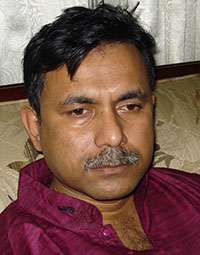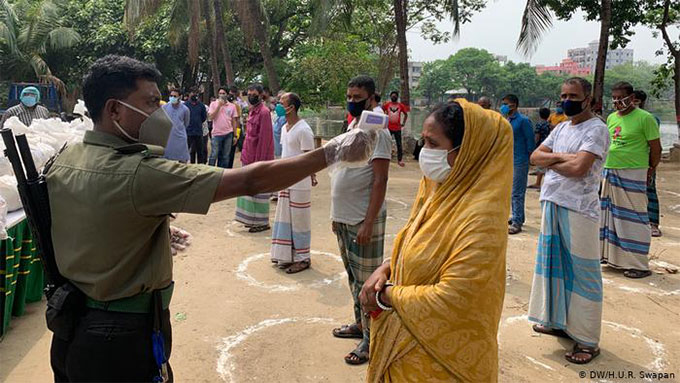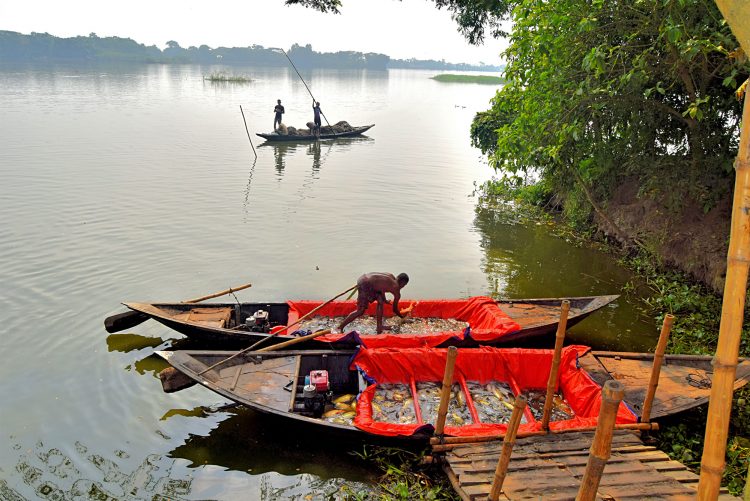 Food And Rights Talk is a series of interviews with PAN Asia Pacific (PANAP) partners across the globe to find out the situation of rural peoples, in relation to food security and human rights, amid the COVID-19 pandemic.
Food And Rights Talk is a series of interviews with PAN Asia Pacific (PANAP) partners across the globe to find out the situation of rural peoples, in relation to food security and human rights, amid the COVID-19 pandemic.
On 15th June, we talked with Sakiul Millat Morshed, executive director of SHISUK, an organisation working on facilitating self-reliant sustainable community development in Bangladesh.
PAN Asia Pacific (PANAP): What is the extent of the COVID-19 pandemic in Bangladesh?
Morshed: It is just over 100days since we first detected COVID, and with our total COVID-19 positive cases are over 100,000, Bangladesh right now is among the 20 highest infected countries. But this is just the tip of the iceberg, because the number of tests being done here is very minimal. Less than 15,000 tests are happening in the country everyday, which is very insignificant considering our population of 170 million people. We started our lockdown on 26th March and it continued til 30th May, and we thought that it would be manageable within that time and we would be able to begin anew on July. But unfortunately, after opening up on the 1st week of June, the detected cases are increasing everyday, along with deaths. So we are passing through the most difficult time right now. Since yesterday, the government again declared a lockdown situation in the big cities.
PANAP: Why do you think Bangladesh has one of the highest cases of COVID-19?
Morshed: One of the major causes is that our government didn’t take it seriously in the beginning. They thought it was just for the Western countries, not for people like us. The government publicized that Bangladesh will not be much affected by this pandemic. Another factor could be religion. In Bangladesh, most people are Muslim, and the religious leaders propagated that Muslims will not be infected because they are doing ablutions at least five times a day.
Besides it has become very much clear that a main factor is that our health system is nowhere in providing standard health services. We have only 5300 beds (158 ICU beds with ventilation facilities) in the whole country, and not enough facilities to get treatment. Private hospitals and clinics are also refusing to take COVID-19 patients. Especially the rural people, they don’t have any place to go for treatment. If you are identified as COVID-19 positive, there’s no place to go to get support for yourself.
Moreover during the lockdown, garment factory owners still tried to open up their factories. Huge numbers of garment workers travelled from different parts of the countries to the cities. That also created a surge in cases.
PANAP: What are the most significant impacts of the COVID-19 pandemic on the daily activity and livelihoods of Bangladeshi farmers?
Morshed: The farmers are mostly affected because this is the peak time of the harvest season, so when they have a good harvest they couldn’t really market it properly because of lack of transportation facilities and a marketplace system to really channel their products to customers. That was one of the major shocks experienced by our farmers. On the other hand, farmers now are preparing for the next cropping season, and they don’t have the resources to go for it. Though government has declared bloc support for agriculture, most of it hasn’t really reached the farmers so far. So that is the situation right now: farmers couldn’t sell their crops and are short of funds for the next cropping season.
PANAP: During the lockdown, are farmers allowed to go to the fields?
Morshed: They can go to the fields, but when you do harvesting, there are zones where people usually travel from other places to harvest the crops. In some cases the lockdown delayed harvest and spoiled some of the rice. There were two cyclones that affected the harvest as well.
PANAP: How is the food security situation?
Morshed: It is difficult to say at this point in time. We just have a good harvest. People also still have some savings to buy food at this point in time. But there is expert opinion that within a few months, the general population will face a very hard time. As per Government there is enough rice stocks. We had a very good burrow rice production, and if we can harvest this rain-fed rice (Aman) that farmers are planting right now, rice might not be a problem, but for other crops like vegetables that is not the case. But people will be facing problems for other expenses because their livelihoods are at stake. A lot of garment workers are going back because garment factories are shutting down. So that would create a crisis for rural workers. A huge number of migrant workers are also coming back. A lot of rural households depend on these migrant workers’ earnings. As you know, globally migration is shrinking now and migrant workers are repatriated to their home countries. That will add another pressure on our rural livelihood situation.
PANAP: What are people doing to cope with unemployment?
Morshed: People are trying to survive off their savings, mostly. For the marginalized poor, the government has some safety net program. That is definitely not enough, still people are surviving on that. Over-all the situation is not really clear because in Bangladesh, there is a lot of media embargo and there is a lack of real reporting of what is happening exactly at the bottom level. In communities where SHISUK is working farmers are better off because we have a different approach, community enterprise approach where we organise farmers. So their farming is not that much affected because they can systematically manage their activities. But in other communities they are really passing through a hard time.
PANAP: Can you talk more about the advantages of this community enterprise approach? Does it include less reliance on chemical inputs?
Morshed: Our community enterprise is based on the flood plain management. Bangladesh is a flood-prone country, we have 2.8 million hectares of floodplain that are usually left idle in the monsoon season. SHISUK help to organise the community to work together to manage bigger flood plain of at least 100 hectares. The model is to convince all the people surrounding that flood plain, raise collective capital by subscribing equitable shares for an enterprise initiative during the monsoon. With our intervention, they transform this flood plain to fish culture fields by connecting villages with an environment-friendly structure to regulate water flow and sustain fish culture. After the monsoon, farmers then do agriculture. The community is not using pesticides because it will affect their fish—when you are doing the fish culture, the flood plain also remains clean, so there is less pest manifestation and this eliminates the need for pesticides. Furthermore, when we are doing fish culture we use supplementary feed like rice bran and mustard oil. The feed residue and fish droppings also contribute to the fertility of the flood plain. So this is the kind of cycle that helps you produce safe food and establish agroecology.
PANAP: Would you say that this kind of farming is more resilient to the kind of shocks brought on by the pandemic?
Morshed: Obviously this is really a model of resilience-building, and we are now promoting this model to the national level. When the whole community is working together, they can face any situation. In different areas, small farmers are struggling to market their products. But our situation is different because farmers are not marketing their products individually. When it’s a collective process, farmers can do better management and this helps them to be resilient.

PANAP: What would be your recommendations to the Bangladesh government?
Morshed: This is our budgeting month and there is a lot of talk about government support for the agriculture sector. Government has given some bloc grants for those affected but what we are trying to pursue is for the government to build a system where farmers can get access to this support directly. Because what happens is when there is some kind of bloc grant, usually most of the corporate sector takes advantage of it, and the marginal farmer has little access because the system doesn’t really allow them to get it directly. For instance, civil society is raising issues on the zero-interest bank loans, which is basically addressed to big farmers or corporate groups. This is because most small farmers don’t have access to bank facilities or don’t have collateral. They cannot comply with the conditions for these loans and will not benefit from it. In Bangladesh, 94% of land is owned by men, while 70% of agriculture labor is done by women. And most of these men are absentee landowners. In that case there is need for land reform if we really want to support the farming community. Along with that we need to recognise women farmers, because their contributions are not recognised.
We are also demanding the government to support community enterprises so that producer groups can have better market access and access to technology at a reasonable price. Government should also subsidise fish feed. There’s also a huge need for storage facilities because farmers are forced to sell their produce to middlemen at a loss because they don’t have any storage facilities. So we’re demanding that community-level storage facilities be created so that they can store their crops and sell them at a reasonable price. We also need cold chain and storage support for dairy and poultry industries. So these are the issues that need to be addressed for food security.
There is another big issue we’ll be facing. In Bangladesh, most marginal farmers usually rear cows to sell during Eid ul-Azha, during this festival where Muslims sacrifice animals (cow, goat, etc.) for Allah. That day is coming within one and half months time but our COVID-19 situation is still reaching the peak. So we are worried that during that time, if the situation doesn’t improve, then the farmers will face problems in selling their livestock. And that would be a real disaster for our farmers, for their food security and survival because this is one of their guaranteed sources of income. It is a safety net kind of thing for farmers to rear one cow and a few goats to cash in at this time. If they can’t sell their livestock, that will be a real challenge so government has to do something in that regard.
Due to this COVID-19 situation, people are also demanding more safe and nutritious food. So government should take more initiative so that farmers can produce more safe food and market it directly to consumers. There should be a farm to fork marketing process.
PANAP: Do you think that this pandemic is also an opportunity to bring change to the agriculture sector?
Morshed: Yes, this is an interesting opportunity as well. In a way people are going back to the rural communities because in the urban areas there are less and less employment opportunities—so people are forced to go back to their origins. Ours is an agriculture-based economy so you really have the opportunity to strengthen the agricultural sector. If we can capitalize on this human capital and our natural resources, that can really give us a strong and sustainable economic base for our country. We have a lot of room to improve our productivity, as we have a lot of natural resources. As I said, 2.8 million hectares of flood plains remains unutilised. SHISUK has been working for 20 years and still we cannot cover more than 1% of this land area, which means there is still a 99% opportunity. Our people are hardworking and there was a kind of illusion, that the young people are going to the urban areas and overseas for employment opportunities. But nowadays this is difficult. So I think that will give an understanding for the new generation to think of something at their home base. And if we can really gather enterprise initiative at the community level to produce safe food, this will give us food security for the country and also rural development. This could be the best opportunity for us.###








Discussion about this post